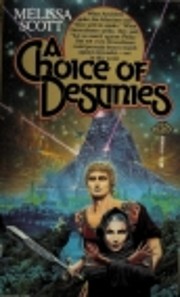

Fai clic su di un'immagine per andare a Google Ricerca Libri.
|
Sto caricando le informazioni... A Choice of Destiniesdi Melissa Scott
 Nessuno Sto caricando le informazioni...
Iscriviti per consentire a LibraryThing di scoprire se ti piacerà questo libro. Attualmente non vi sono conversazioni su questo libro. This is an historical fantasy that is also an alternate history. The premise is that Alexander the Great never made it into India. He was called home to deal with an uprising and then he went west to Rome instead. That is the alternate part. The fantasy part is that the gods are real and appear to Alexander in fevers and dreams. There is also a seer who brings him messages from the gods about choices he has to make. Its a very minor part of the story and can be seen as no different than modern people and their belief in religion. Not going to India meant he didn't get the terrible final chest wound in India, Hephaestion didn't die, and they didn't end up in Babylon in the summer. Alex didn't eventually die of drink/poison/illness or a combination of all 3 in 323 BC. Instead after he dealt with the uprising in Greece, Alex took on the Romans and won, there was no one who could out-general him. He then had to spend the rest of his time consolidating and pacifying his empire - which meant it was stable when he died. Because of his principles religion was respected but not the driving factor in civilization, and there were no dark ages. The Alexandrian empire was still around in the 1500s and they were flying because scientific exploration and learning were given priority. They were in space in the 1700s. Scott uses 2 changes to the history of Alex, before he is prevented from entering India: Thebes was never destroyed (they were needed to rise later with Athens and Sparta to draw him back to Greece) and he ends up with a son much sooner, so he is 10 years old when Alex returns to Greece. Interestingly the dead Greek wife who is the child's mother is Eurydice and so I wonder if Scott has Alex marrying his father's newest wife (widow) and raising Philip's son (his half-brother) as his son and heir? Olympias is still around, but somehow she didn't kill them when Philip died ? Its never explained. Neither is how Thebes survived explained, other than they postponed their treachery for about 10 years. I will say that Alexander respecting the Sacred Band rather than slaughtering them seems much better than reality. The story looks at Alex and his Friends/Companions as they return to Greece, deal with the uprising, and then set out for Rome and deal with politics, and war there. I liked how the settings were done, and how the characters were developed and portrayed. I thought the writing was a bit clunky, awkward and didn't quite make sense in some scenes. It wasn't terrible, but it was a problem that hovered over the book. The other issue is that although this was ancient history, there were interlude chapters that followed the development of the empire after Alex's death. Each one was in a different place, a different time, and dealing with different issues. It was a good idea and interesting, but with the writing problems it made the story choppy. Even with the problems I thought the book was worthwhile and I wish it had followed Alex longer. I enjoyed it. Melissa Scott has created an amazing book here. Historical fiction concerning Alexander the Great has recently captured my attention and I have been eagerly devouring anything to do with the subject. This book, unlike the previous ones I've read, takes Alexander on a different route. What if Alexander skipped India? What if he went towards Rome? What if he had an heir before he started his journey? All of these questions and more create an interesting and exciting story. I would definitely recommend this story. I thought Melissa Scott captured Alexander the Great's character very well. Hephaistion also plays a large part, and even Bagoas is mentioned. I've never thought about what Rome would do if Alexander came calling, and the author has written a very plausible theory. Again, I recommend this story. If you're interested in other historical fiction concerning Alexander the Great, I recommend Mary Renault's Alexander trilogy: Fire from Heaven, The Persian Boy, and Funeral Games. I also just finished Lord of the Two Lands by Judith Tarr and would recommend that if you'd like to see Alexander from an Egyptian point of view. I'd also like to note that I was a bit put off by the cover art showing what looks like outer space. The majority of this story takes place in Alexander's time period. There are a few short chapters (only a few pages long) which are spread throughout the book, and take place far in the future; they deal with what is left with Alexander's empire. Not something I particularly cared for, but they did not take away from my enjoying the story. nessuna recensione | aggiungi una recensione
Non sono state trovate descrizioni di biblioteche |
Discussioni correntiNessuno
 Google Books — Sto caricando le informazioni... Google Books — Sto caricando le informazioni...GeneriSistema Decimale Melvil (DDC)813.54Literature English (North America) American fiction 20th Century 1945-1999Classificazione LCVotoMedia: (3.33) (3.33)
Sei tu?Diventa un autore di LibraryThing. |
|||||||||||||||||||||||||||||||||||||||||||||||||||||||||||||||||||||||||||||||||||||||||||||||||||||||
I like what-ifs, so this is definitely my kind of book, and it was a fun and exciting read. (